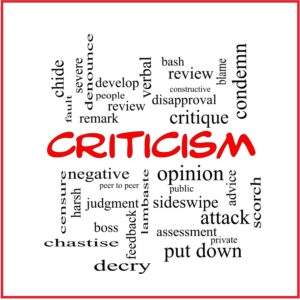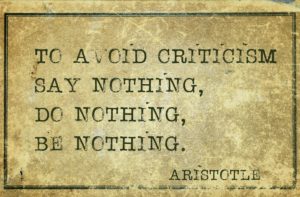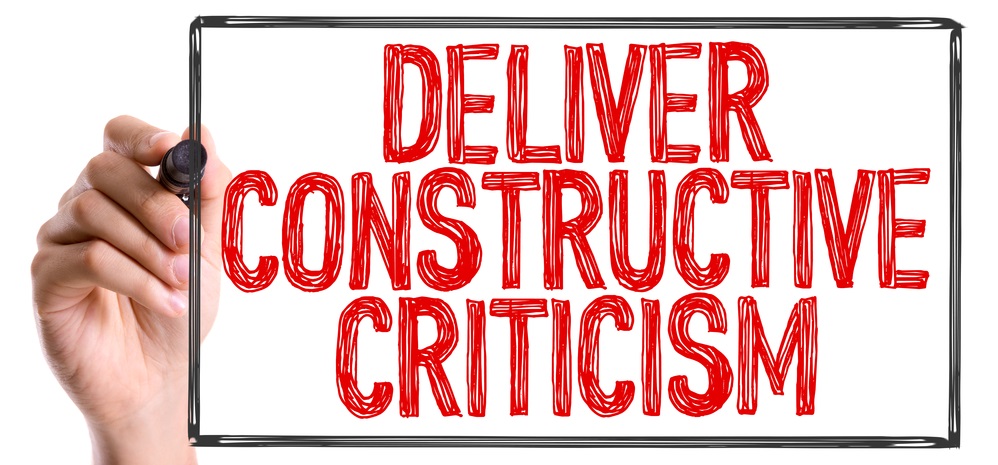 This article includes some powerful tips on how to handle criticism. It also includes three steps you can use that I have added at the end of the article. You can use these steps to help make sure that criticism doesn’t take you out.
This article includes some powerful tips on how to handle criticism. It also includes three steps you can use that I have added at the end of the article. You can use these steps to help make sure that criticism doesn’t take you out.
I have also included a list of recommended reading for those of you who are looking for a little more information on the subject.
Do you have a tough time accepting criticism? It is safe to say that most people have issues with accepting criticism. No one wants to hear that they are wrong or doing something inadequately.
It is important to note that being open to criticism is an integral part of our success. Being able to recognize when we are wrong is the first step towards adjusting our course so that we are successful!
If you want to learn how to accept criticism with grace, here are some tips!
Consider the Source of the Criticism
The first step towards accepting any criticism is to consider the source. It is important that you should not care about everyone’s opinion.
It is important to consider whether or not the person offering the criticism is from someone you respect.
That should be taken into consideration. If you are getting criticism from someone who is a habitual complainer, you might consider just ignoring them.
Consider Suppressing Your First Reaction
 It is normal when we first hear some criticism to want to fight back. However, it is important to try to suppress this initial reaction, until you have some time to examine the criticism.
It is normal when we first hear some criticism to want to fight back. However, it is important to try to suppress this initial reaction, until you have some time to examine the criticism.
Even though you might want to get angry or run away right away from the person, take a moment to reflect on their words.
In fact, it is a good idea to take some time before responding to someone.
Consider the Criticism as a Chance to Learn
If we take time to think about it, criticism is nothing more than a chance to learn more about yourself.
It is a chance to welcome criticism rather than fear it. It is an opportunity to be more curious.
Of course, you probably aren’t going to like what you hear, however, you may learn something about yourself.
It could be an opportunity to find areas of improvement you can work on.
Consider Asking Questions
It is a good idea to not just receive the criticism but to actually consider asking the person some questions.
Instead of lashing out angrily, consider asking some clarifying questions. Acknowledge the person that you have heard their criticism.
Then ask them specific questions about why they have said what they have. Who knows, maybe they are offering you a way to be more successful in something you are trying to do.
Consider Taking Some Time to Ponder the Comments
 Taking some time before commenting, is a good way to process what has been said and figure out if it is valid or not.
Taking some time before commenting, is a good way to process what has been said and figure out if it is valid or not.
This is a particularly good way to handle criticism when it stings.
Taking some time will help you to think about how you actually want to respond to the person.
Consider that You Don’t Know the Reason for the Criticism
Maybe the criticism was unexpected and you are feeling that it came out of the blue. If this is so, it is important to remember that you may not know what the other person is experiencing.
Although it may be no excuse to take it out on you, you just never know what the other person is going through in their own life.
Often the criticism is more about them than you!
Consider Thanking Them for the Criticism
When we thank someone for their comments, we actually defuse the situation. They might be taken by surprise. You may actually be able to have a civil conversation with them.
It just might turn your biggest critic into your biggest cheerleader!
Consider Taking to a Friend You Trust
 There is no reason to keep your feelings to yourself. If you get especially painful criticism, reach out to someone you trust and talk to them about the comments.
There is no reason to keep your feelings to yourself. If you get especially painful criticism, reach out to someone you trust and talk to them about the comments.
They may be able to put the comment into a better perspective so that you are able to handle the criticism. They could also remind you how special you are and that they will always have your back.
Here are Some Actionable Steps:
- Make a list of people whose criticism you would actually value. Think of your loved ones, people you care about or are inspiring. Consider the people in your field who have achieved what you want to achieve.
- Reflect on the most significant piece of criticism you have received lately. Write it down and take some time to think about it. Was the criticism warranted? Did it help you at all? Sometimes in retrospect, you will find a lesson that you never even realized you needed to learn.
- Start a criticism journal. When someone you have respect for supplies you with constructive criticism, jot it down in a journal. Then take a moment to consider if the criticism is warranted or not. If it is then you can create an action plan to address the situation.
Final Thoughts:
 It is important to remember that criticism can be either valid or wrong.
It is important to remember that criticism can be either valid or wrong.
It can offer us an opportunity to see things about ourselves that we may not have been aware of before.
Criticism can be viewed as positive feedback.
In fact, criticism can be used as the fuel that makes us stronger and more successful and lets us live our best life.
So the next time someone offers some criticism, remember that you have the tools in order to handle criticism effectively!
How To Handle Criticism Video:
The Truth Doesn’t Have to Hurt – when handled carefully, criticism, honest, genuine, hard-to-hear criticism, promotes trust and respect, motivates individuals, and serves as a catalyst for change. If that sounds far-fetched, it’s because few understand how to properly give and receive the kind of critical feedback that brings positive results.
Thanks for the Feedback: The Science and Art of Receiving Feedback Well – the book explains why receiving feedback is so crucial yet so challenging, offering a simple framework and powerful tools to help us take on life’s blizzard of offhand comments, annual evaluations, and unsolicited input with curiosity and grace.
The Feedback Imperative – the book reveals the hidden reasons why giving feedback to employees can be so difficult and yet so urgently needed in today’s workplace, and provides the definitive steps for overcoming feedback avoidance and taking great leaps forward with employee engagement, retention, and performance.
Everyday Feedback Workbook: Get Going With Honest Helpful Feedback – the Everyday Feedback Workbook offers leaders and individual contributors at all levels information, techniques, and encouragement to make frequent feedback your most powerful leadership strategy.





